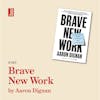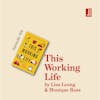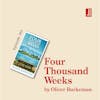The Culture Code by Daniel Coyle: How to build a team
Sign up to the bookmark newsletter:
https://mailchi.mp/1119b1358a84/thebookmark
About the Author
Daniel Coyle is the New York Times bestselling author of The Talent Code, The Little Book of Talent, The Secret Race (co-authored with Tyler Hamilton), Hardball: A Season in Projects, and other books.
Winner (with Hamilton) of the 2012 William Hill Sports Book of the Year Prize, he is a contributing editor for Outside Magazine, and works as a special advisor to the Cleveland Indians. Coyle lives in Cleveland, Ohio during the school year and in Homer, Alaska, during the summer with his wife Jen, and their four children.
Source: http://danielcoyle.com/author/
About the Book
Where does great culture come from? How do you build and sustain it in your group, or strengthen a culture that needs fixing?
In The Culture Code, Daniel Coyle goes inside some of the world’s most successful organizations—including Pixar, the San Antonio Spurs, and U.S. Navy’s SEAL Team Six—and reveals what makes them tick. He demystifies the culture-building process by identifying three key skills that generate cohesion and cooperation, and explains how diverse groups learn to function with a single mind.
Coyle unearths helpful stories of failure that illustrate what not to do, troubleshoots common pitfalls, and shares advice about reforming a toxic culture.
Combining leading-edge science, on-the-ground insights from world-class leaders, and practical ideas for action, The Culture Code offers a roadmap for creating an environment where innovation flourishes, problems get solved, and expectations are exceeded.
Culture is not something you are—it’s something you do. The Culture Code puts the power in your hands.
Source: http://danielcoyle.com/the-culture-code/
Click here to buy on The Book Depository
https://www.bookdepository.com/The-Culture-Code/9781847941275/?a_aid=stephsbookshelf
Links
Read an extract of the Culture Code here: http://danielcoyle.com/excerpt-culture-code/
BIG IDEA 1 (5:35) – Safety, even in war time, and the importance of belonging
You’ve probably heard about psychological safety. The key to this is belonging which is finding little similarities as humans. One of the most extreme examples in the book is the Christmas Day truce that happened in World War I between the British and allied troops and the German troops.
In one of the most awful wars that happened in modern history, the troops stopped fighting, came out of the trenches and celebrated Christmas together but this wasn’t an accident. This started weeks before with a series of mini ceasefires when the soldiers on both sides were collecting their dead, the other side stopped shooting.
The other soldiers didn’t use that vulnerability to take advantage but let them get their fruits of lies. There are few things that quite human levels that seemed off limits. At night time the troops were singing to each in different languages and different cultures singing across the trenches.
This will make you think if this is possible for troops to connect with each other hours after shooting each other, it’s also probably possible for you to find connection with Karen from accounts.
Another example would be in a call center environment where attrition is very high. At WIPRO in India they did an experiment on three groups go through the induction. Group one just went through the standard induction. Group two went to the induction with an additional hour added on where they found out more about the company’s values and origins and spoke to star performers. They also received a fleece with the WIPRO logo on.
The third group did the normal induction plus an extra hour but the extra hour was focused on the new hires. They discussed what they can bring to WIPRO, their contribution and potentials. They also received a fleece with the WIPRO logo on alongside the employee’s name.
Seven months later, the group with the extra hour about them and with the fleece with their name on it were 250% more likely to still be there than the group who had the extra hours that was focused more about the company and 157% more than the control group. This shows the idea of belonging.
BIG IDEA 2 (10:25) – Vulnerability… again
One of the ideas around this is sharing your screw ups. As the leader, the person people are looking up to, you need to be able to share where things went wrong and what you would have done differently.
Another important role is asking for, and providing, feedback. The key with this is candor, not brutal honesty. Some people are applying this popular message in the wrong way by being brutal rather being candid in their feedback – the difference lies in tact. For both sharing screw ups and inviting feedback, it is important to normalize conversations around what worked, didn’t work, what each contribution was and sharing feedback and getting better.
It is the ability to be vulnerable without fear of repercussion, reprimanded, sacked or kicked off the team. It is feedback done in a constructive way not in a toxic way.
BIG IDEA 3 (13:14) – The purpose of purpose.
The purpose of purpose is to help people belong, which links nicely to big idea number one. It helps people connect with why they are there, what is the work they are doing and why they exist. Coyle shares that you need to be much clearer about your purpose – about ten times more clear than you think you already are being.
This is how you test and measure what is happening with your purpose. He talks that using catch phrases and artifacts as visual reminders of signs and signals of what they belong to and why they are doing the work they’re doing.
This also how you measure what matters. By being really clear on your purpose and how it’s coming to life, you can measure the behaviors rather than the outcomes. A lot of our rewards and recognition are based on outcomes rather than behaviors and that is where teams often fall down.
Learning from those mistakes to make things better, create the systems to support your purpose, what you stand for and what makes you successful.
Music By: Don't Stand a Chance - Instrumental Version Song by OFRIN
Let’s Connect
LinkedIn: www.linkedin.com/in/steph-clarke
Instagram: @stephsbizbookshelf
Enjoying the show?
Please hit subscribe so you don’t miss an episode and leave a review on iTunes to help others find us.
See omnystudio.com/listener for privacy information.
Hey, have you subscribed to the bookmark newsletter? If you liked this, you might like my twice-monthly email with book reviews and ideas of what you should be reading, and listening to, next. Click here to subscribe.
Popular episodes
Here are some great episodes to start with.

















